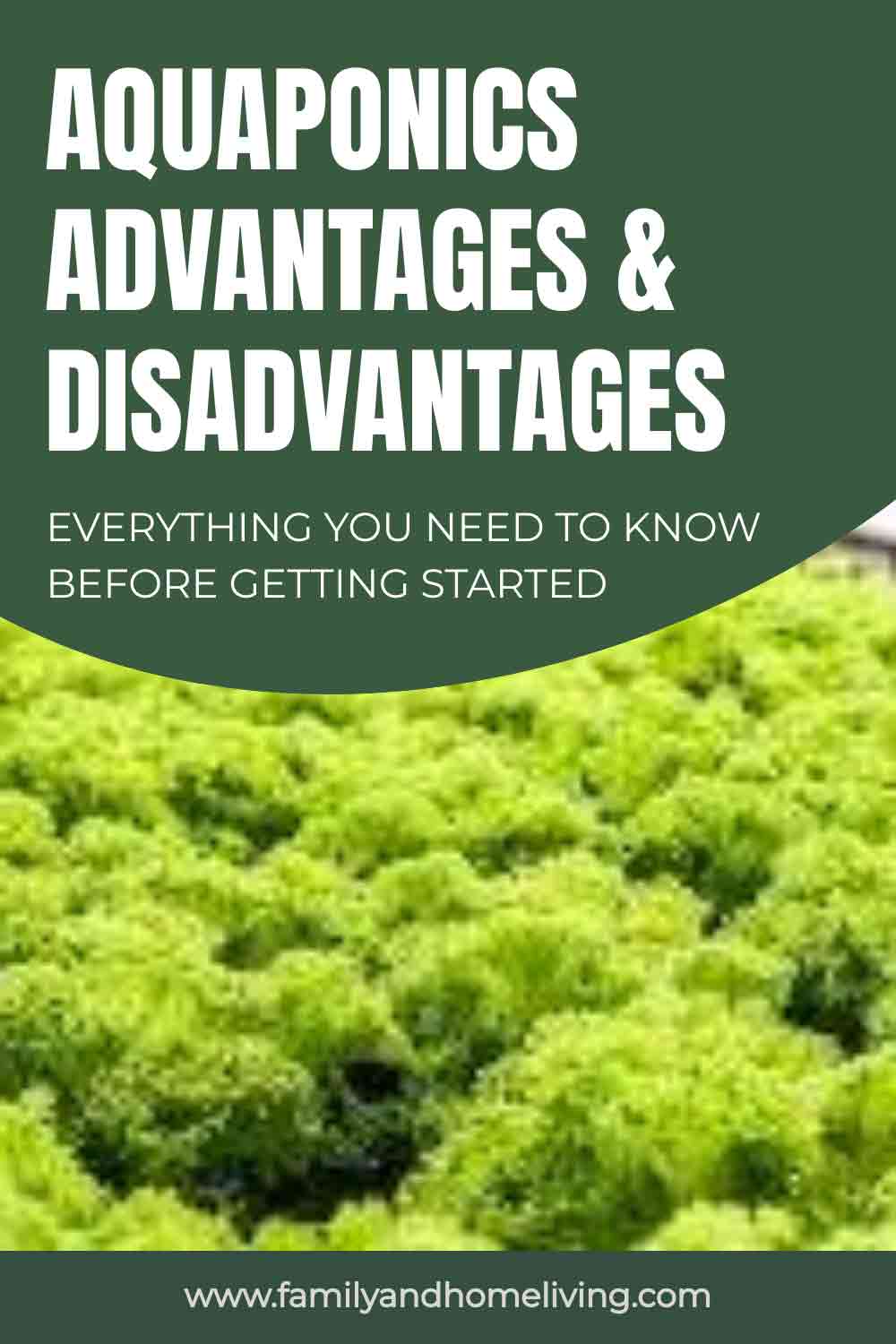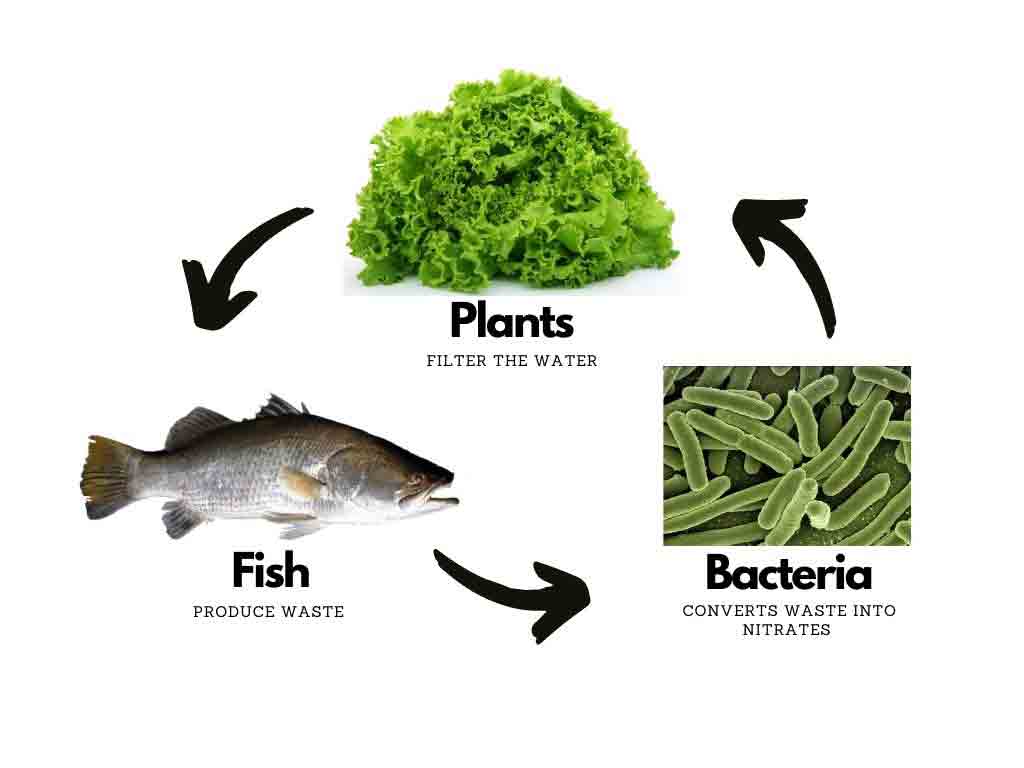This post may contain affiliate links which means we might earn a small commission if you decide to make a purchase through them (at no extra cost to you). Need more info? Click Here
In our last article, What Is Aquaponics & How Does Aquaponics Work, we looked at how aquaponics work, the aquaponics nitrogen cycle and how the symbiotic relationship between aquaponic fish and plants not only benefits both species but also how the aquaponics system benefits us as well. In this article we want to explore the many aquaponics benefits and advantages there are when investing in a DIY aquaponics farm for your home.
As you know aquaponics is a completely natural way of growing and rearing plants and fish that are 100% organic and healthy. By combining aquaculture (fish farming) and hydroponics (farming without soil) an amazing two-in-one aquaponics farming system is created with many benefits and advantages. This is especially true for backyard farmers, hobbyists and gardeners who might not necessarily have a lot of space and would prefer a small aquaponics system.
Please pin this article if you find it helpful! Thank you 🙂

Aquaponics Benefits & Advantages
Healthy, Fresh And Nutritious Food
One of the biggest advantages of aquaponics is the 100% organic food that you can harvest from your aquaponic farm. This is probably the number one reason most backyard farmers, hobbyists and gardeners decide to set up a small aquaponics farm at home. Not only is the food you grow completely organic but it is always fresh, healthy and tastes better than food grown using traditional farming methods.
Zero Fertilizers, Pesticides or Chemicals
Food growth using commercial fertilizers are known to be less healthy and nutritious because the fertilizers encourage faster growth rather than higher nutritional values. They contain harmful heavy metals such as uranium, lead and mercury which negatively affect the lungs, kidneys and liver.
Additionally, chemical fertilizers can make their way into rivers and lakes as well as into groundwater systems which can result in contamination that negatively affects sensitive eco-systems and natural environments.
Another major health risk that comes with the excessive use of the synthetic fertilizer is that it may increase the risk of developing cancer. A 1973 study links high levels of sodium nitrate in groundwater with gastric cancer. Synthetic fertilizers can also potentially increase one’s risk of dying from different types of cancer for up to six times. These include prostate cancer, brain cancer, non-Hodgkin’s lymphoma, and leukemia.
www.drugwatcher.org
By setting up your own small aquaponics system you can be completely confident that all the food you grow is completely free from all artificial fertilizers, pesticides and chemicals usually used in traditional farming methods. Equally the fish you raise will be free from growth hormones, antibiotics and pollutants.
A Self-Contained Ecosystem
Aquaponics creates a balanced eco-friendly system where plants can grow and thrive while receiving all the nutrients they need from fish waste which has been converted into nutrient-rich water. The plants help to filter, clean and oxygenate the water that is fed back to the fish from where the entire cycle begins again.

Aquaponic fish such as Tilapia or Trout produce waste which is converted into plant-loving nutrients by beneficial bacteria in the aquaponics system (the aquaponics nitrogen cycle). The nutrient-rich water feeds the aquaponic plants which encourages them to grow and thrive! The aquaponic plants clean, filter and oxygenate the water which is then fed back to the fish where the cycle begins again.
Save and Conserve Water
When it comes to aquaponics vs traditional farming, one of the biggest aquaponics benefits is the amount of water it saves – aquaponics uses between 90% to 95% less water than traditional farming!
When watering traditional farmland or a backyard garden, a lot of the water is lost through evaporation or directly in the soil so the water often doesn’t have the chance to reach the roots of the plants. Very little water is lost in an Aquaponic system because the same water is continuously being recycled and reused by the aquaponic plants and fish in the system.
Additionally, in traditional aquaculture and hydroponics systems, there is a lot of wastewater created that needs to be siphoned off and replaced with clean fresh water. An aquaponics system solves this problem by constantly reusing and recycling the water in the system benefitting both the aquaponic plants and fish.
Year-Round Harvesting of Crops and Food
One big aquaponics benefit is the ability to grow food all year round. This is especially true if you are using an aquaponics greenhouse where you can regulate the growing environment and water temperature. You will not be affected by the seasons or weather conditions guaranteeing your family healthy, organic food all year round. Plant, grow and raise your aquaponic fish and plants 365 days a year!
No Soil, No weeding
Just like hydroponic systems, there is no soil involved in an aquaponics farm system. There are therefore very few weeds if any. An added benefit of not using soil means that you pretty much eliminate any soil-borne diseases that could affect your plants and crops.
Faster Growth
Aquaponic plants and crops have been found to a lot grow faster than traditional crops because they have access to the nutrient-rich water within the system 24 hours a day. They naturally grow faster and are healthier because they live in an almost perfect growing environment with all the nutrients they need to thrive.
Vegetable & Protein Crops
Unlike separate aquaculture and hydroponics systems, an aquaponic farm allows you to grow and raise both aquaponic fish such as Tilapia or Trout as well as aquaponic vegetables. Many aquaponic farmers also grow herbs as well as fruits such as dwarf fruit trees, blood oranges, grapefruit and bananas!
Multiple Income Sources
An added benefit for backyard farmers who work from home is that one efficient aquaponics system produces multiple income sources for their farms and businesses – fish, vegetables, fruit and herbs.
Efficient And Sustainable
Once your aquaponics system is established and up and running, it will mostly take care of itself especially if it is a small aquaponics system. You will obviously need to feed your fish every day and make sure that the water levels are correct. You also don’t need a lot of space to get started and it is easy to start small and grow as you gain experience and your needs change.
Food Security
Self-sufficiency and food independence is becoming increasingly important and an aquaponic farm is a great way to ensure your family has everything they need to live healthily if things get tough. Your home aquaponics system allows you to grow healthy, sustaining crops even if your space is limited, you live in an area where the soil isn’t fertile, the land is rocky or prone to long periods without rain.
A family that is striving to live off the grid and be completely self-sufficient would benefit greatly from an aquaponics farm system.
The number of people in the world affected by hunger increased in 2020 under the shadow of the COVID-19 pandemic. After remaining virtually unchanged from 2014 to 2019, the prevalence of undernourishment (PoU) climbed to around 9.9 percent in 2020, from 8.4 percent a year earlier.
www.fao.org
In terms of population, taking into consideration the additional statistical uncertainty, it is estimated that between 720 and 811 million people in the world faced hunger in 2020.
Read More: Popular Aquaponics Books
What are the disadvantages of aquaponics?
Although the benefits of a home aquaponics system far outweigh the disadvantages, especially once your system is established, there are some disadvantages of aquaponics you should consider and be aware of.
Planning
One of the first aquaponics disadvantages for backyard farmers is the initial setup of a DIY aquaponics system. It isn’t as simple as one would think and it can be pricy if you don’t start with the right guidance and planning.
For example, if you move ahead too quickly and add aquaponic fish to your system too early you could easily lose all your fish. Or you could add too many fish to the system and your aquaponic vegetables won’t be able to effectively clean your water.
Investing in a DIY aquaponics step-by-step course would be a great place to start and will help you to avoid any unnecessary expense or frustration when setting up your aquaponics farm system especially if you are a beginner.
Setup Cost
Aquaponic farms can be more expensive than a standard garden as you will need to pay for equipment such as pumps, tanks, grow lights, tubing and grow beds; aquaponic fish such as tilapia or trout; fish food; aquaponic plants; electricity and other running costs.
Depending on where you live you might find that your system will do better undercover, such as in a greenhouse or canopy, which can be pricy to set up. If however, you compare aquaponics to other hobbies or the cost of buying organically grown fish and plants it could work out well for your family especially considering the many advantages which come with aquaponic farms.
Electricity
All aquaponic systems require some sort of power or electricity source to run the water pumps that you will need. If you are planning small-scale aquaponic backyard farming or you only want to try aquaponics as a hobby, you won’t really need to use a lot of electricity and solar panels could run your home aquaponics system easily. But obviously, size does matter and the bigger you go the more electricity you will use.
Time
Initially, it takes time to learn how aquaponics work and there is definitely a learning curve involved especially if you are a complete beginner to aquaponic farming. It also takes time to establish the good bacteria colony that you need to make your home aquaponics system a success.
You will most likely experience challenges and disappointments along the way but most of the time it won’t be hard to deal with problems as they come up. But starting small and building up from there is a great way to tackle aquaponics for beginners.
Water Monitoring
Water will need to be monitored to ensure that the water quality is good and it is the correct PH. This is especially true in the first couple of months. Once you have finished setting up aquaponics and the system is mature, you will usually only test the water about once a week unless there are problems with the system.
Fish Care
You will need to make sure that your aquaponic fish have the correct fish food and have a healthy diet. Most people buy commercial fish food for their aquaponic fish but many supplement this diet by growing worms as well as feeding the fish duckweed and other plants.
Unexpected Aquaponic System Failure
You could lose your aquaponic vegetables or fish if your home aquaponics systems fail. You will need to have a backup system in place to make sure that especially your fish remain alive if something goes wrong. Your aquaponic plants are most likely to be unaffected for a short amount of time but the fish will not if they don’t have the oxygen that they need.
Aquaponic Crops
In theory, you can grow just about anything in your aquaponic garden all the way from fruit trees to tomatoes to microgreens. However some crops, such as potatoes. carrots and corn don’t grow well and aren’t worth the effort. Most people usually start by growing green leafy vegetables as their primary crops and then move on from there.
Some crops that do really well in an aquaponic garden include lettuce, spinach, strawberries, bell peppers and cherry tomatoes.
Lighting
If your aquaponic farm is inside you will need to make sure that your aquaponic plants have enough light to grow and flourish. For example, bell peppers need about 18 hours of light a day to thrive. You will need to ensure that you invest in good, high-quality grow lights for the aquaponic vegetables you are growing.
Conclusion
Aquaponics benefits are many and while some the disadvantages listed here can seem overwhelming, most of them only really apply to new and unestablished systems. With correct planning and guidance, you will easily be able to set up a DIY aquaponics system to suit you and your pocket. And soon, your family will be benefitting from organically grown fish and vegetables that you have grown and reared yourself.
It’s your turn… do you think setting up a DIY aquaponics farm is worth it?





